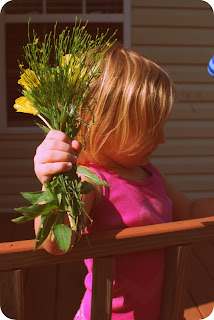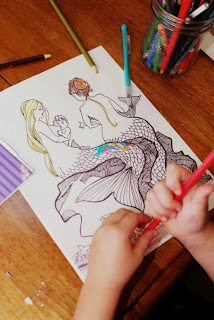 |
| The Dread Pirate Grace and her ship |
Sometimes, though, curious moms will ask me about how we "do" things, wanting more info for their own decisions. I'm not sure I'm qualified to offer advice exactly, but I'll take an official whack at it here.
I'd suggest first starting out by reading Families Where Grace is In Place, because if you're endeavoring to teach your child anything in value in life with an adversarial attitude, you're doomed from the beginning. Maddening experiences will be had by all.
Secondly, I'd promote reading Nurture by Nature, which introduces the idea that each child's individual personality effects the way they relate to others and take in information. If you expect your child to be your learning clone, then both you and he/she will end up incredibly frustrated, feeling fairly bad about your basic selves. If you've ever printed some adorable project off Pinterest and had experience end up an epic horror show, and if you've stood there blinking, wondering why your tot didn't enjoy it...this book is worthy of your time and attention. It's an easy, painless read, and it's relatively easy to identify your child's basic style pretty quickly.
For the last reading suggestion, I'll recommend Last Child in the Woods, which addresses the unfortunate habit our culture has developed of placing small children indoors in a chair, expecting them to do written work about the world before they've had a chance to actually go out and OBSERVE the world around them in context. Excellent read, even if you just skim.
Now. I don't know if this qualifies as wisdom, but it's certainly a heartfelt opinion based on things I've observed in my own family, which you may take with a grain of salt or the whole margarita.
 Read to your small children. Pick classic books or thoughtful fiction or stories, filled with beautiful descriptive language. Randomly stop at words and sound out the letters when you're reading together (no need to make them do it, just do it in front of them.) It'll become apparent what your child is interested in and what they aren't. Listen to books on tape in the car. Talk to them. Make up stories together. Converse with them as if they're intelligent (they are), explaining the meaning of words at random if they look confused. Describe what you're doing as you cook, fish, garden, sew, shop, dance or whatever it is that you fill your days doing. Enjoy yourself, and don't be so serious!
Read to your small children. Pick classic books or thoughtful fiction or stories, filled with beautiful descriptive language. Randomly stop at words and sound out the letters when you're reading together (no need to make them do it, just do it in front of them.) It'll become apparent what your child is interested in and what they aren't. Listen to books on tape in the car. Talk to them. Make up stories together. Converse with them as if they're intelligent (they are), explaining the meaning of words at random if they look confused. Describe what you're doing as you cook, fish, garden, sew, shop, dance or whatever it is that you fill your days doing. Enjoy yourself, and don't be so serious!Put them in the way of fascinating things, and let them do what comes naturally to children! Place them in environments where their natural gifts come alive.
Teach them to pay for things. Let them cook things. Let them build fires outside, climb trees, play in streams, lick rocks and catch enormous bugs. Talk about those things with them. Let them have their own conversations in public. Let them order their food at restaurants, if they're ready and able to do it well. Have them ask for directions for things they need in the store. Teach them to ask intelligent questions. Involve them in conversations with interesting people. Teach them how to put on their own bandages, clean their own wounds, scrub their own nails, pour their own drinks, and recognize their own need for rest.
For the love of pete, don't ever let your own pride and desperate need for recognition from some critical friend or family member tempt you to reduce your preschooler or toddler into a trick-doing parrot trained to impress others with long lists of memorized facts. (Such people are life-sucking vortices of doom, and you can almost never satisfy them. It's better to grow thicker skin, or, better yet, grow happily and purposefully oblivious to their tongue clucking over your 3yo who can't say her ABCs yet.)
Small children are naturally driven by curiosity and a love for discovering things, but this can be overridden by an even stronger basic animal need if it's withheld like a dangled carrot: the need for love and approval from a parent. Some will defy you (and rightly so), but some will dutifully jump through your silly hoops just to see you beam at them. The cost of turning your wee one into a performing monkey can come back to bite you in the ass, though, in the form of loss of creativity and free thinking (and sometimes, honest relationship free from need of approval). And you force your very small children to perform "learned" facts for the standards of other people, you will have turned them into yourself; unable to cope without the approval and recognition of opinionated others.
Let them get lost in hours of pretend. Toss out the toys that leave no room for any imagination. Let them dump endless buckets of water into trenches they dig in the back yard and watch how the water takes the path of least resistance. Notice with them how ants walk in a long line, and how they carry things bigger than their own bodies. Feed birds in the winter and go hunting for squirrel nests when all the leaves are gone. Pretend to be hibernating bears under couch cushion forts.
In other words...don't make them "do school". Let them be humans. Incorporate words and counting and letters as they naturally occur throughout the day, without sweating "how much" they retain as evidenced through constant quizzing. They have plenty of time for all that later. Teach them how to learn about things with their own minds and hands and observations, and they'll learn the facts of the world...and later, you come back and give what they've already observed names. It's easier to learn once you have a solid grasp on your own physical abilities and what things look/smell/taste/sound/act/behave/sound like. :)















